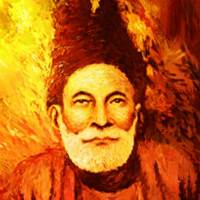sham
is tarah hai ki har ik peḌ koī mandir hai
koī ujḌā huaa, be-nūr purānā mandir
DhūñDhtā hai jo ḳharābī ke bahāne kab se
chāk-e-har-bām har ik dar kā dam-e-āḳhir hai
āsmāñ koī purohit hai jo har bām-tale
jism par raakh male māthe pe sindūr male
sar-nigūñ baiThā hai chup-chāp na jaane kab se
is tarah hai ki pas-e-parda koī sāhir hai
jis ne āfāq pe phailāyā hai yuuñ sehr kā daam
dāman-e-vaqt se paivast hai yuuñ dāman-e-shām
ab kabhī shaam bujhegī na añdherā hogā
ab kabhī raat Dhalegī na saverā hogā
Evening
Every tree is an ancient, dark, deserted temple
whose walls are split open, the roof caving in.
The temple is looking for an excuse to let go entirely,
tumble into ruins. The sky is a Brahmin priest,
body smeared with ashes, forehead stained vermilion.
The sky is bowed in timeless, silent reverie.
There is also an invisible sorcerer
who has trapped the world in his spell,
attached the skirt of evening to the skirt of time
without a seam-which means twilight
will never be snuffed out,
darkness will never descend.
Night will not deepen, daybreak will never come.
The sky longs for the spell to break,
for the chain of silence to snap,
for the skirt of time to tear itself away.
The sky listens for a conch to shrill,
an ankle bell to ring;
it waits for a goddess to awaken, her dark veil cast off.
āsmāñ aas liye hai ki ye jaadū TuuTe
chup kī zanjīr kaTe, vaqt kā dāman chhūTe
de koī sañkh duhā.ī koī pāyal bole
koī but jāge, koī sāñvlī ghūñghaT khole
is tarah hai ki har ek peD koi mandir hai
koi ujDa hua, be-nur purana mandir
DhunDhta hai jo KHarabi ke bahane kab se
chaak-e-har-baam har ek dar ka dam-e-aKHir hai
aasman koi purohit hai jo har baam-tale
jism par rakh male mathe pe sindur male
sar-nigun baiTha hai chup-chap na jaane kab se
is tarah hai ki pas-e-parda koi sahir hai
jis ne aafaq pe phailaya hai yun sehr ka dam
daman-e-waqt se paiwast hai yun daman-e-sham
ab kabhi sham bujhegi na andhera hoga
ab kabhi raat Dhalegi na sawera hoga
Evening
Every tree is an ancient, dark, deserted temple
whose walls are split open, the roof caving in.
The temple is looking for an excuse to let go entirely,
tumble into ruins. The sky is a Brahmin priest,
body smeared with ashes, forehead stained vermilion.
The sky is bowed in timeless, silent reverie.
There is also an invisible sorcerer
who has trapped the world in his spell,
attached the skirt of evening to the skirt of time
without a seam-which means twilight
will never be snuffed out,
darkness will never descend.
Night will not deepen, daybreak will never come.
The sky longs for the spell to break,
for the chain of silence to snap,
for the skirt of time to tear itself away.
The sky listens for a conch to shrill,
an ankle bell to ring;
it waits for a goddess to awaken, her dark veil cast off.
aasman aas liye hai ki ye jadu TuTe
chup ki zanjir kaTe, waqt ka daman chhuTe
de koi sankh duhai koi payal bole
koi but jage, koi sanwli ghunghaT khole
- Book : Nuskha Hai Wafa (Pg. 327)
Additional information available
Click on the INTERESTING button to view additional information associated with this sher.
About this sher
Lorem ipsum dolor sit amet, consectetur adipiscing elit. Morbi volutpat porttitor tortor, varius dignissim.
rare Unpublished content
This ghazal contains ashaar not published in the public domain. These are marked by a red line on the left.



